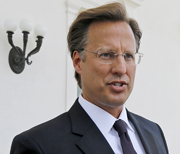David Brat’s Immigration Stance Doesn’t Square with His Free-Market Flair
 David Brat won a stunning and surprising victory in last week’s primary election in Virginia, unseating House Majority Leader Eric Cantor (R-Va.). But Brat doesn’t seem to understand the very issue that seems to have dominated his historic upset and propelled him to Capitol Hill.
David Brat won a stunning and surprising victory in last week’s primary election in Virginia, unseating House Majority Leader Eric Cantor (R-Va.). But Brat doesn’t seem to understand the very issue that seems to have dominated his historic upset and propelled him to Capitol Hill.
Brat considers himself a free-market conservative, claiming on MSNBC following his unexpected win that he’s against “any distortion to free markets.” Brat also campaigned against immigration reform, saying that “It’s the most symbolic issue that captures the difference between myself and Eric Cantor in this race.” But it’s impossible to square Brat’s laudable support for free markets and his opposition to immigration reform.
Immigration is an economic issue. Fundamentally, it is about the movement of workers, entrepreneurs and consumers to locations where they can maximize the value of their labor, businesses and purchasing power.
But America’s current immigration system is highly protectionist and restrictive. In contrast to the first 131 years of American history, there is currently no green card for lower-skilled workers. Some highly skilled workers, families and refugees can get green cards, but there is no category for lower-skilled workers unless they are closely related to an American. That severe prohibition on the movement of lower-skilled workers is a deep and destructive intervention into the market economy.
Similarly, the paltry number of highly regulated temporary guest-worker visas allowed for migrants cannot compensate for the lack of green cards. For example, four federal agencies regulate the H-2A visa for temporary farmworkers. Firms have to sponsor migrants, limiting the ability of the migrant to move to better opportunities and the ability of American firms to hire away the best workers from their sclerotic competitors. Minimum wages for guest workers and other rules limit worker and employer flexibility.
These are some of the issues that might have gotten fleshed out in the immigration reform bill that Congress was expected to vote on after the midterm elections. But with Brat’s campaign victory over Cantor, which focused on blasting the prominent Virginia Republican for working with the Obama administration on immigration reform, many are predicting it won’t happen.
Only a lightly regulated economy can determine efficient wages and the optimal allocation of workers to variously demanded tasks, but the government intercedes at every step of the immigration process. Expensive labor certification requirements that seek to protect American workers from migrant competition make a mockery of free markets.
And yet Republicans are somehow able to claim the mantle of free-market advocacy while making draconian immigration restrictions a touchstone of their political platform. Brat fancies himself a free-market economist, but he can’t seem to comprehend this glaring contradiction.
A big part of the problem is a lack of understanding about why immigrants come to the United States and what effect they have on the economy once they’re here. Contrary to the rhetoric, they don’t come for welfare and they don’t take jobs away from Americans.
Immigrants come when there are economic opportunities and many return to their home countries during recessions. Net Mexican immigration stopped cold during the housing and economic collapse of 2007 and 2008. Italians returned home en masse during the Panic of 1907. Like goods and capital sent across borders in search of higher prices and profitable investments, immigrants come when there is prosperity.
Supporting free trade in goods, services and capital is a great boon for the economy, but it is even more pro-growth to support the free movement of workers across borders. Immigration adds more workers who seldom compete with Americans because of their different skills, consumers and entrepreneurs to already economically vibrant locations. The late free-market economist Julian Simon observed that people are the ultimate resource. Immigration concentrates and increases the number of people exactly where they can do the most economic good — if only the government got out of the way.
Millions of Americans want to hire immigrants, sell them property and work next to them in their jobs. Their desires to engage in voluntary and free exchange with immigrants on mutually beneficial terms — without onerous government regulations preventing that exchange — vastly outweighs the desire of protectionists or nativists who want to block immigration. Brat’s support for free markets, if it is consistent, obligates him to support freer immigration.




Comments
Join the discussion on Facebook
Join the discussion on Facebook.